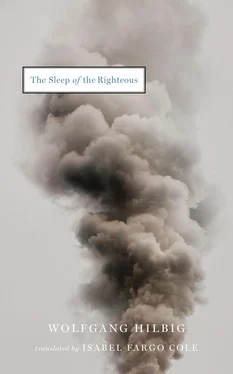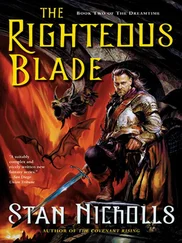At that time there was a dearth of men in town; most of the children were fatherless, and many remained so forever. Time refused to pass, bearing down on them like a weight that stunted their growth. And the sole liberation from boredom lay in growth, in the adulthood that all the others had achieved some incalculable time ago and no longer wasted a word on. And the books we read, the stories we made up and told, as a rule featured only adults, and for the most part only men. — The mere thought that you were still small made you sick, you sickened with boredom. . There were no fathers to take pride in your growing up after them. Or they were mayors, policemen, pharmacists, teachers. . or miners, waiting for their pensions, so tired in the evenings that they never spoke a word. — For the mothers, it seemed, you always stayed a child, they seemed to forget you had a name, all your life you were the child for them, eternally neuter. . and I heard my mother calling me, in the rooms, in the hallway, across the yard, through all the floors her clear voice rang. . Child, she called, where are you? Where’ve you been all this time? — And when we crossed the railroad tracks to reach the strip mines, or entered the woods that began beyond the expanse of ruins, when we vanished all day from our street, out of reach of the town and adults, in the evening she cried: Just look what the child’s been up to again, just look at the child, what a sight! — She cried these words even though I’d returned intact, almost entirely unscathed, giving no cause for concern whatsoever. .
It was an affront: for a time whose end seemed out of sight you were condemned to the life of little kids for whom the months, the years passed only in arid theory, in the form of a convention the adults were set upon; any actual passage of time would occur only in the intangible future. It was a stuffy, stubbornly opaque doom that hung over the whole town, but over our street with special vividness: there were no fathers there to make still littler children.
Little kids was our collective name, rarely heard without a touch of scorn, which seemed to vanish only when the big kids on our street wanted something from us. They’d say, for instance, “here, have a smoke”; we ignored the condescension, put on finicky expressions, and helped ourselves. Pensively we’d roll the cigarette between thumb and forefingers until someone offered us a light. We’d have loved to strike a match on our boot heel, something we’d never seen done. But we’d eavesdropped on grown-ups who’d seen it in movies in the American zone of Berlin, for us an utterly unreachable continent. We’d never been to the movies, not even to one of the town’s two movie theaters; besides, we lacked the boots for the purpose. The big kids struck matches on the glass of shop windows; we’d seen that and tried it ourselves when we could get our hands on a matchbox — in kindergarten and later at school the possession of matches was seen almost as an act of sabotage — but our matches wouldn’t light, or rarely lit, on the glass panes, and usually the indignant shopkeepers chased us off.
Once we’d lit the cigarettes, the big kids came out with what they wanted: it would seem to be some risky matter. When they had a ticklish task for us, they avoided the word kid . But since such jobs required someone who looked particularly harmless, an indirect disparagement remained. — Apparently I never really looked harmless, and so the jobs regularly went to those who were even smaller, or a half to a full year younger than me, with my eccentric birth date. — We’d off-handedly promise to look into the matter; in reality we rarely did a thing, and had to spend a while on the run from the big kids. But they swiftly forgot what they’d needed, or it would prove superfluous; after a time we sat on the curb once again, bored and unmolested, awaiting our maturity.
And this waiting was contradictory: on the one hand our goal was to grow older, to rise at last from the state of useless, unfinished, in-between beings; on the other hand, perhaps still worse than the alternative, that would thwart any permanent alliance with the power of the summer in our street. — For we saw how the adults suffered from the heat; we nodded understandingly, even chimed in with their laments, we cursed along with them when a yearned-for storm refused to come and the thunder bogged down above the woods in the east. In reality, though, we took in the incandescent air as though every trickle of sentimentality had to be parched from our innards. We breathed the smoke that rose from the furrows and faults in the street dust, we took in the afternoons’ paralyzing stillness like the golden-yellow vapors of alchemistic smelters, which made us younger, yet lent our faces the ancient grins of African demon masks. — If it ever did rain at night or in the morning, the midday sun leeched all the moisture from the furrows of the road, from that one lane of deep ruts that led across the railroad tracks and all the way out to the strip mines. . and after a thunderstorm had indeed come, when the sky was white-blue again, the ruts were transformed into two channels of water that reached to the calves, and on the surface floated a fine film of reddish ash.
In winter the street was frozen rock-solid, with the menacing glitter of frost in the petrified mud’s recesses. Every day now, with torturous slowness, the cumbersome ash carts passed, so broad that on our stretch of the street there was room for just one at a time. They were welded together from strong, rusty steel plate, and the remnants of paint not yet burned away were rust-red as well. With bodies that tapered toward the bottom to ease the dumping of the ash, they resembled armored battleships; swaying slightly, grinding and groaning, they crept out of town in a cloud of exhaust; the fat, black, rubber tires clearly found little traction in the sometimes iced-over ruts of the street. The ash carts left a lingering wave of salty fumes between the buildings; you tasted it, felt its sting in your throat and your lungs, and long after the carts had passed the air seemed roiled by invisible, burnt-smelling waves. The trapezoidal monsters hauled the fuel waste from all the households and the rebuilt industrial plants out of town and dumped it in the first of the mine pits. . the first mine pit had once been the largest, though only the deepest half contained water; in the meantime it had been filled by ash, rubble, and rubbish to become the smallest of the so-called “final voids.” — The wagons were drawn by prodigious brewery horses, just as rust-red as the ash carts, steaming and grinding away just like them. High on a wooden bench sat a driver swathed in black and dusted with brown ash, clicking his tongue constantly and puffing on a charred, crooked pipe. With their shoes slipping on the frozen mud crests, now and then the utterly phlegmatic beasts would stop; the coachman’s long, arcing whip, tip flicked out, sank from the white sky onto the horses’ huge rumps, darting there artfully until the mighty animals, making reluctant fluttery sounds with their nostrils, resumed their trot once more; fine wisps of ash rose from their coats as the man on the wooden seat administered those tiny, well-aimed rapier jabs that sometimes cracked like distant gunshots.
One day, two of the poor beasts had fallen into the ash just as the wagon was unloading, and dragged the entire vehicle along with them. — We were told this by the railroad gateman; he hardly spoke a word otherwise, but the accident had horrified him too deeply to pass over it in silence. The pit’s crumbling rim — only the frost, he said, had lent it a deceptive stability — had given way beneath the weight of the wagon and team; the driver was standing alongside, and only a quick-witted backward leap saved his life. But the horses, snarled in their harnesses’ tangle, slid with the wagon down the steep slope to the bottom of the mine, where they sank into the subterranean embers covered only by thin layers of cooled ash. The beasts’ bellowing whinnies. . no, their shrieks, said the signalman, must have been heard all the way to town; the whole area was filled by the rank smell of burned hair and flesh. — My grandfather, said to love horses more than people, had come running to the ash pit from his nearby allotment garden, clutching a shotgun, but before he could reach the site of the accident the horses had already fallen silent; death had seized them. All the same, the men shot from above to make the heaps of flesh stop twitching, but it was no use. And in the end, the weeping driver hurled his tobacco pipe down into the depths of the mine pit!
Читать дальше












